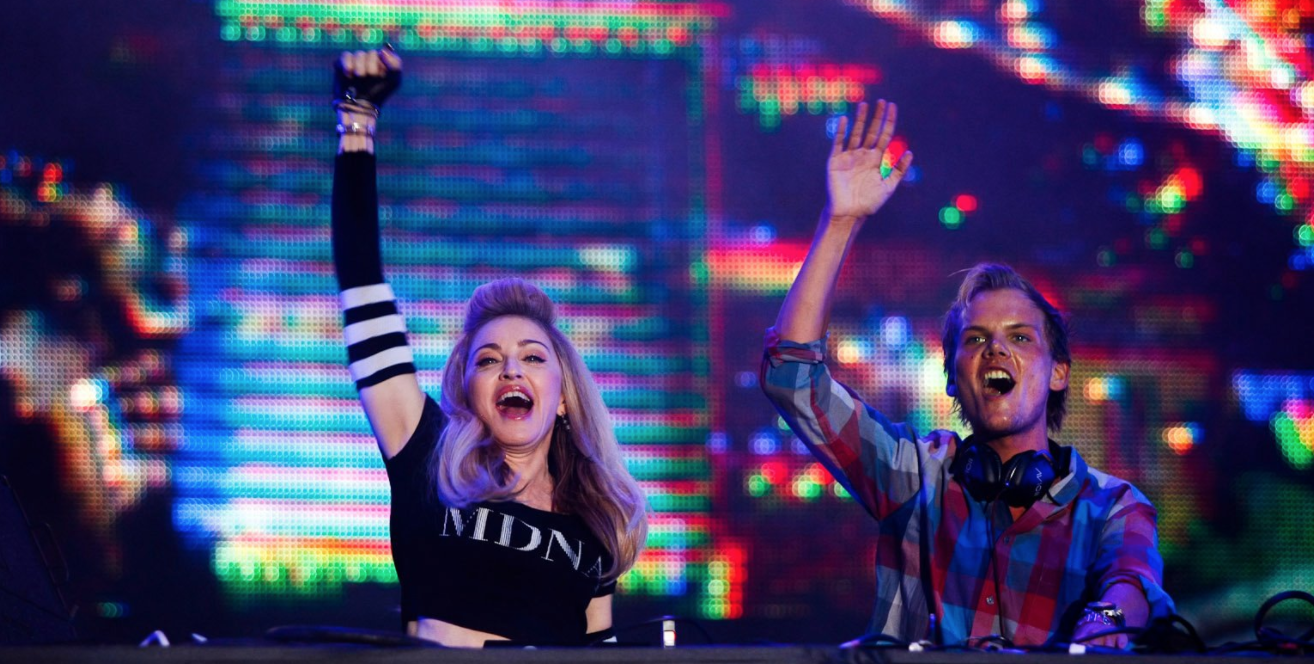If anyone can empathize with the grueling nature of a meteoric rise and the tour life associated with it, it’s Madonna. The difference between her and ΛVICII, however, was that she never gave into the pressures of the “lifestyle.” Herself a fixture on the underground club scene during peak New York cultural history–the early 1980s–Madonna’s affinity with electronic and dance music has taken many shapes and forms over the years. From “Bedtime Story” (produced by Bjork–as a favor to Nellee Hooper, she’ll remind you) to “Music” (produced by Mirwais Ahmadzaï), Madonna has repackaged her love of the dance floor time and time again. And in 2012, her alignment with ΛVICII at the Ultra Music Festival to promote the release of her then most current album, MDNA, couldn’t have been more well-timed. In addition to the fact that her album was released on the same day that Ultra kicked off, March 23rd, the promotion of her “Girl Gone Wild” single in the form of a new remix from ΛVICII (billed as Madonna vs. ΛVICII instead of simply “ΛVICII Remix”) was also the ideal moment to showcase the musical synergy between the two.
With their professional relationship established, Madonna eventually tapped (not sexually) ΛVICII to produce a large bulk of the songs that would become the crux of the “Heart” aspect, thematically, of 2015’s Rebel Heart. Starting with the first track produced by ΛVICII on the album, “Devil Pray,” there is an eerie foreshadowing to the toll ΛVICII’s own life had taken on him as Madonna explained the background of the song to Interview as follows: “…it’s about how people take drugs to connect to God or to a higher level of consciousness. I keep saying, ‘Plugging into the matrix.’ If you get high, you can do that, which is why a lot of people drop acid or do drugs, because they want to get closer to God. But there’s going to be a short circuit, and that’s the illusion of drugs, because they give you the illusion of getting closer to God, but ultimately they kill you. They destroy you.” ΛVICII’s own endless experience with dosing himself to keep up with the lifestyle peddled by what it meant to be a fixture of the EDM “industry” is manifest in a documentary about his touring life called Avicii: True Stories, released in 2017, detailing “the stress of life on the road [that] led the Swedish superstar to multiple hospitalizations–for inflammation of the pancreas linked to excessive drinking, for a burst appendix and for a gallbladder that needed to be removed.”
The same year, in promotion of the film, Rolling Stone asked ΛVICII about his collaborative process with Madonna in 2015. He self-deprecatingly remarked, “I’d love to work with her again, but that was right when I was busiest, and I think she might have been disappointed in me for not being able to put in as much time as she wanted. A lot of things start suffering when you don’t have the energy or time to do things properly. You think you can get away with it, but the quality suffers.” ΛVICII’s arcane understanding of the very same subjects that Madonna wanted to explore on Rebel Heart are also apparent on “HeartBreakCity,” “Wash All Over Me,” “Messiah” and “Rebel Heart.” Incidentally, the very first lyrics Madonna teased from the album were from “Wash All Over Me,” establishing the often apocalyptic motif of the record by choosing to highlight, “All of my illusions could be shattered in a second/You can thread a needle with a teardrop from my eye.” The dramatic lyrical tone of her ΛVICII-produced songs on Rebel Heart are perfectly contrasted against danceable beats. Because, in order to survive, we must always dance through the tragedy that is life.
A number of unreleased demos from the record also showcased the symbiosis of their respective musical strengths, with Madonna exploring the dark side of love and emotions to the moody and frenetic backbeats of ΛVICII-devised synths on the likes of “Addicted” and “Alone With You.” Her politically charged nature also shines through on the emotional “Borrowed Time” (available on the extended play of Rebel Heart), as well as her saucier “rebel” side on the cheeky “Two Steps Behind Me,” a song many would like to believe is about Lady Gaga (another unreleased track, produced by Natalia Kills, “Trust No Bitch,” perhaps takes the sentiment behind “Two Steps Behind Me” even further).
Something in the alignment of circumstances that led Madonna and ΛVICII to one another seemed to pertain to the need to re-create that which, musically and creatively, Madonna had been missing for so long. Speaking of that time when dance clubs and music in general were at their rawest, Madonna noted of the record, “There’s a looking back here, a missing the beginning of my career when I was surrounded by other artists… like Keith Haring and Basquiat and Warhol. It was a time when pop music was more naive and free. I was missing that feeling and that mixture of so many different worlds in New York.” Another somewhat prescient comment in an interview with The New York Times found Madonna saying, “And it’s bittersweet for me to think about that [period]. It just seemed like a time where I wanted to stop and look back. It’s kind of like survivor guilt. How did I make it and they didn’t?” Alas, now Madonna can once again say the same of the gone too soon DJ and producer that brought so many highlights to Rebel Heart, enriching the career of another icon of the dance floor.























